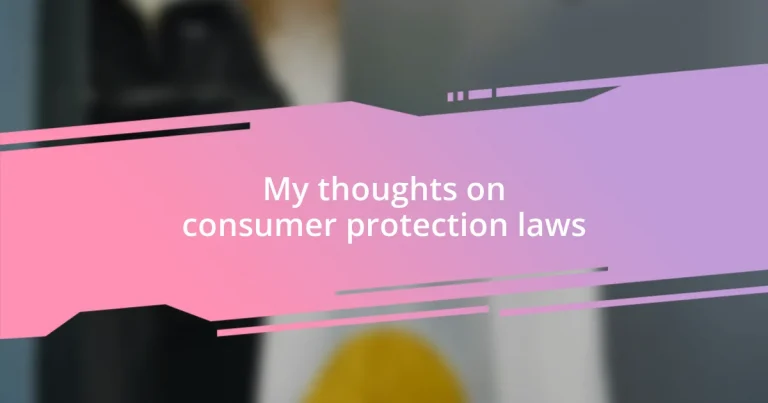Key takeaways:
- Consumer protection laws are essential for safeguarding individual rights, ensuring businesses are accountable, and helping consumers make informed purchasing decisions.
- Key components of these laws include false advertising, product warranties, the right to refunds, and data protection, which collectively uphold consumer trust and safety.
- Current challenges in consumer protection include the rise of unregulated online sellers, outdated laws struggling to keep pace with technology, and a lack of consumer awareness regarding their rights.
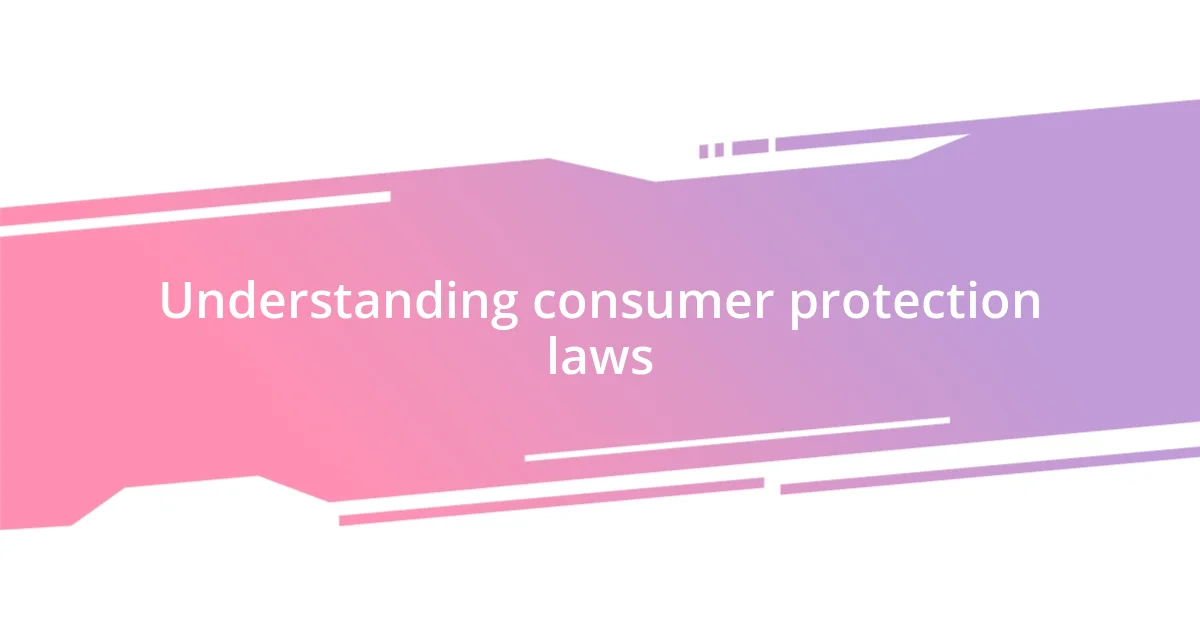
Understanding consumer protection laws
Consumer protection laws are designed to safeguard the rights of individuals when they interact with businesses. I remember purchasing a smartphone that had misleading specifications. After a frustrating customer service experience, I discovered that these laws helped me secure a refund. Have you ever felt overwhelmed by a purchase that didn’t meet expectations? Those laws exist to ensure businesses are accountable.
These laws cover various areas, including false advertising, defective products, and unfair trade practices. Think about it: without these laws, businesses could easily mislead consumers without fear of repercussions. It’s a comforting thought knowing there’s a framework in place that prioritizes our rights and safety as consumers.
Understanding these laws empowers us to make informed decisions. If I had known more about my rights during that smartphone saga, I could have acted decisively sooner. So, why not take a little time to learn how these regulations impact your next purchase? You might find it protects not just your wallet but your peace of mind too.
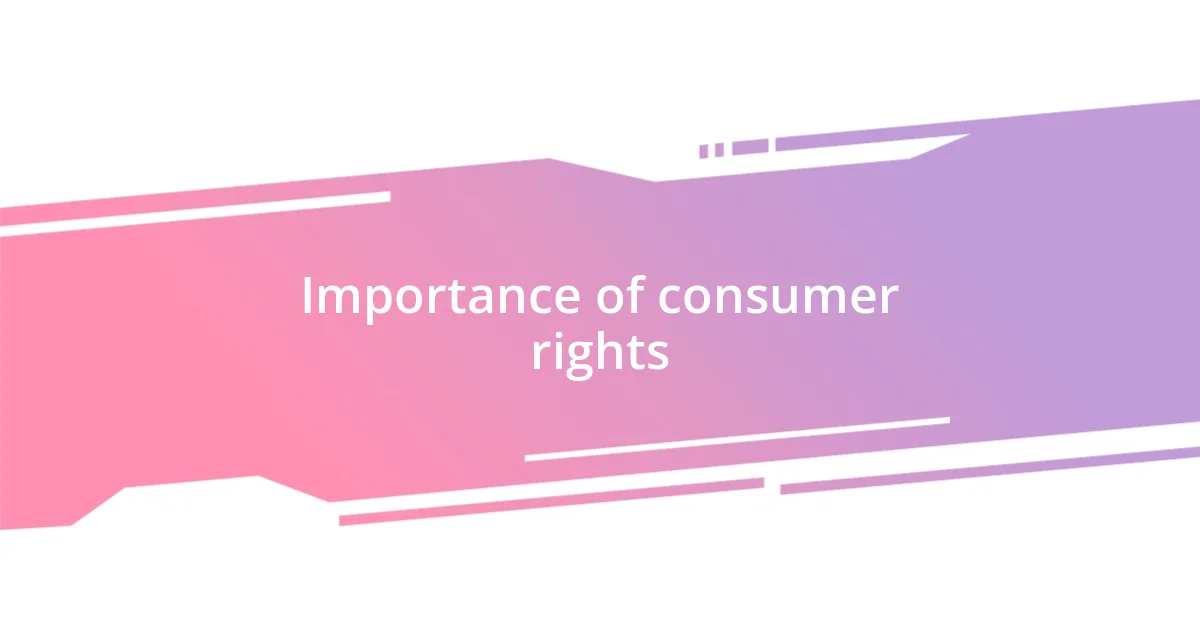
Importance of consumer rights
Consumer rights are vital because they offer consumers a safeguard against exploitative practices. I recall a time when I bought a kitchen appliance that promised to be energy-efficient. After realizing it consumed more power than advertised, I was relieved to know I could file a complaint. This assurance not only empowers consumers but also creates a more trustworthy marketplace.
Moreover, the importance of consumer rights extends beyond individual experiences, impacting the overall economy. When companies know their customers can hold them accountable, they are motivated to improve their products and services. Picture a world where businesses felt no pressure to maintain integrity—chaos would reign, and consumer trust would plummet.
Lastly, consumer rights foster a sense of confidence among buyers. When I make a purchase, I feel more secure knowing that there are laws in place to protect me if something goes wrong. Wouldn’t you agree that this security promotes better spending habits? It encourages us to invest without the constant worry of being deceived.
| Aspect | Tie to Consumer Rights |
|---|---|
| Protection | Safeguards consumers from misleading practices |
| Accountability | Businesses held to higher standards |
| Trust | Encourages informed purchasing decisions |
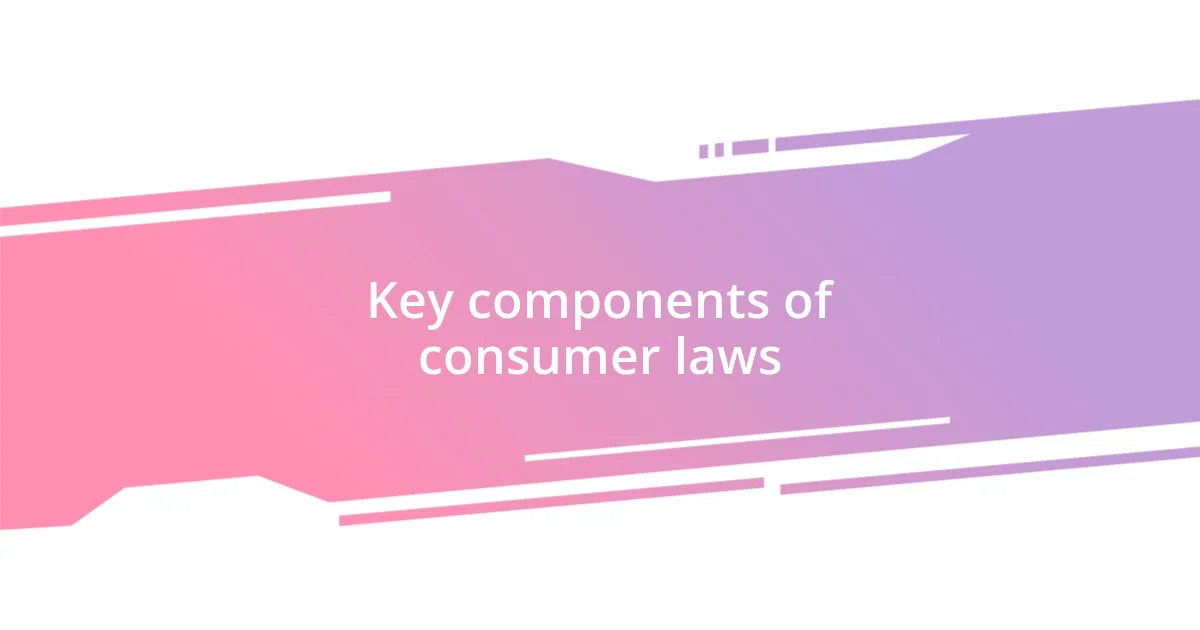
Key components of consumer laws
Consumer laws incorporate several key components that work together to protect individuals. For instance, I’ve often relied on the principle of ‘truth in advertising.’ When I come across a bold claim about a product, it’s reassuring to know there are standards preventing companies from making false statements. This not only keeps businesses honest but also helps ensure that I make purchases based on accurate information.
Here are some of the essential components of consumer laws:
- False Advertising: Prohibits misleading claims and ensures that all marketing is truthful.
- Product Warranties: Guarantees that products meet certain standards and remain functional for a specified period.
- Right to Refund: Allows consumers to return products under specific conditions, protecting against poor purchases.
- Data Protection: Ensures that consumer information is handled securely and transparently.
In my own experience, when I purchased a laptop that didn’t function as promised, the right to a refund became my lifeline. It’s moments like these that make me truly appreciate the safety net these laws provide.
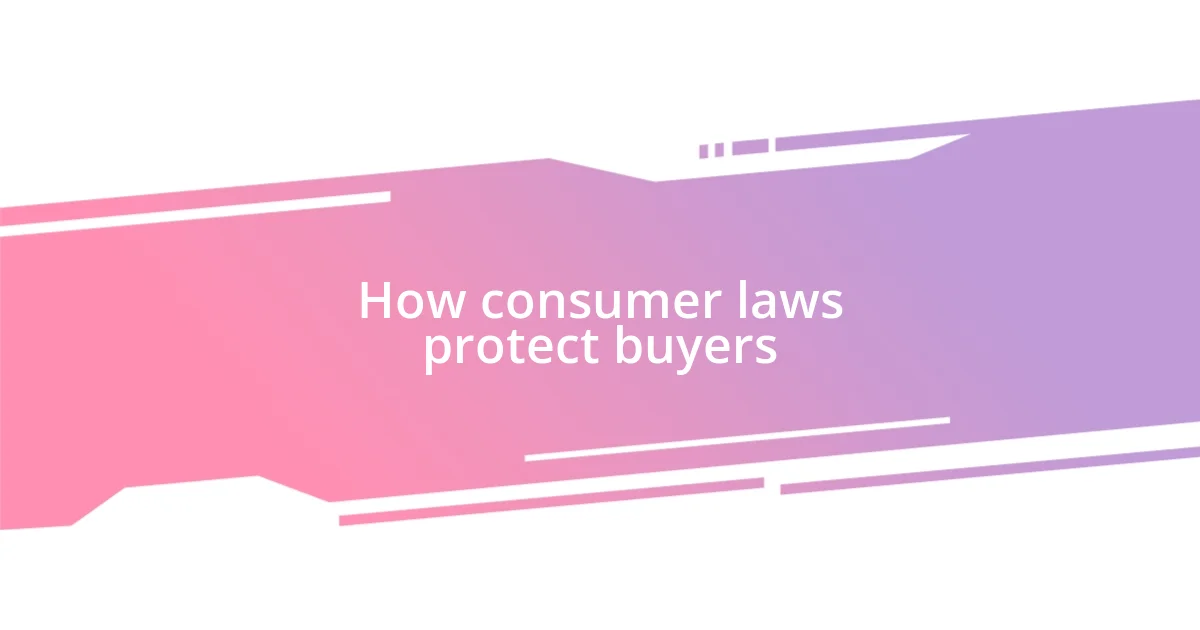
How consumer laws protect buyers
Consumer laws play a pivotal role in ensuring that buyers are kept safe from deceptive practices. One time, I bought a seemingly fantastic skincare product that caused a nasty reaction. Knowing I had the right to file a complaint with the relevant authorities made me feel empowered. It’s comforting to recognize that these laws act like a safety net, providing recourse when we face issues that diminish our trust.
The protective measures established by consumer laws also extend to ensuring that businesses uphold their promises. Recently, I encountered a situation where a retailer refused to honor a warranty for a broken appliance. However, because consumer laws mandate accountability, I was able to press the matter further and gain clarity. Have you ever faced resistance when seeking help? These laws are essential for reminding businesses that they must be held to a standard.
Moreover, the sense of security that consumer laws bring cannot be understated. I often reflect on how much easier it is to make purchases when I know I won’t just be left high and dry. Whether it’s the right to a refund or protection against false advertising, these laws encourage us to shop with confidence. Don’t you think that this level of protection fosters a more positive shopping experience for everyone?
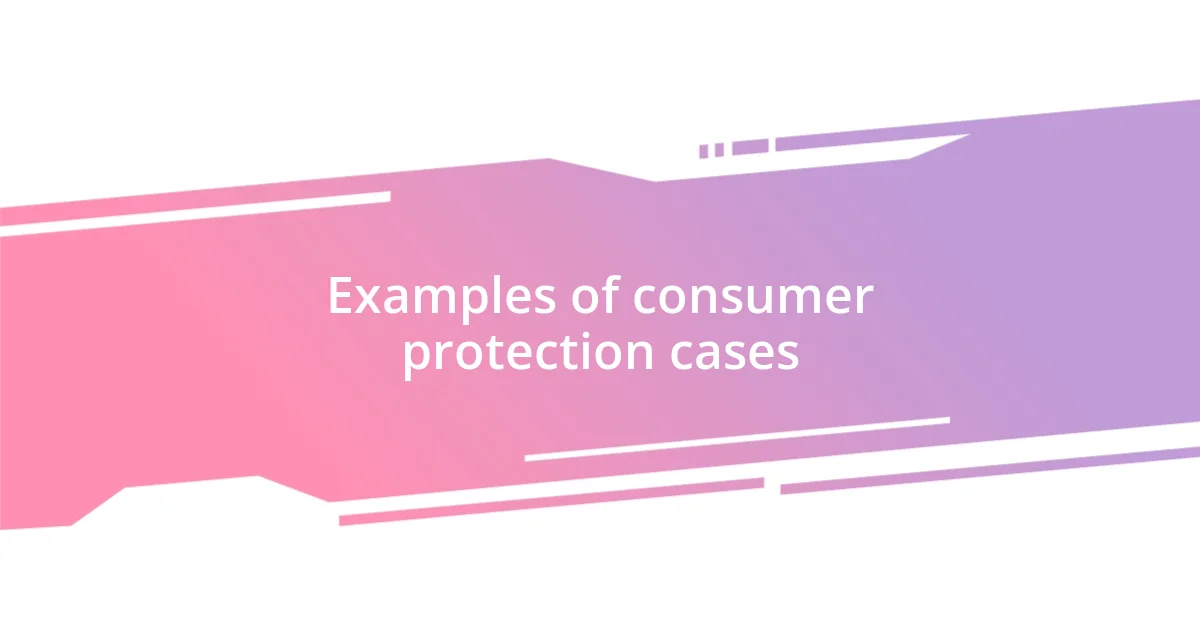
Examples of consumer protection cases
One of the standout cases in consumer protection history involved the infamous Volkswagen emissions scandal. The company falsely advertised their vehicles as environmentally friendly, only to be revealed as having software that cheated emissions tests. This deception not only misled countless consumers but sparked significant legal ramifications and financial penalties. Can you imagine buying a car with the belief you’re helping the environment, only to find out it was all a facade?
Another gripping example that comes to mind is the infamous “hot coffee” case involving McDonald’s. In this scenario, a woman suffered severe burns from a cup of coffee that was deemed excessively hot, which led to a lawsuit. The jury eventually awarded her damages, emphasizing the expectation that companies must maintain reasonable safety standards. It raises an important question: should consumers bear the burden of protecting themselves from risks that businesses could easily mitigate?
Lastly, I recall a local electronics store that sold defective smartphones. After numerous complaints, a consumer advocacy group stepped in, pushing the retailer to honor guarantees and provide refunds. This incident reminds me of the power of collective action: when we band together to stand up for our rights, we can create real change. Have you ever felt that empowering surge when you realize your voice can influence how businesses operate?
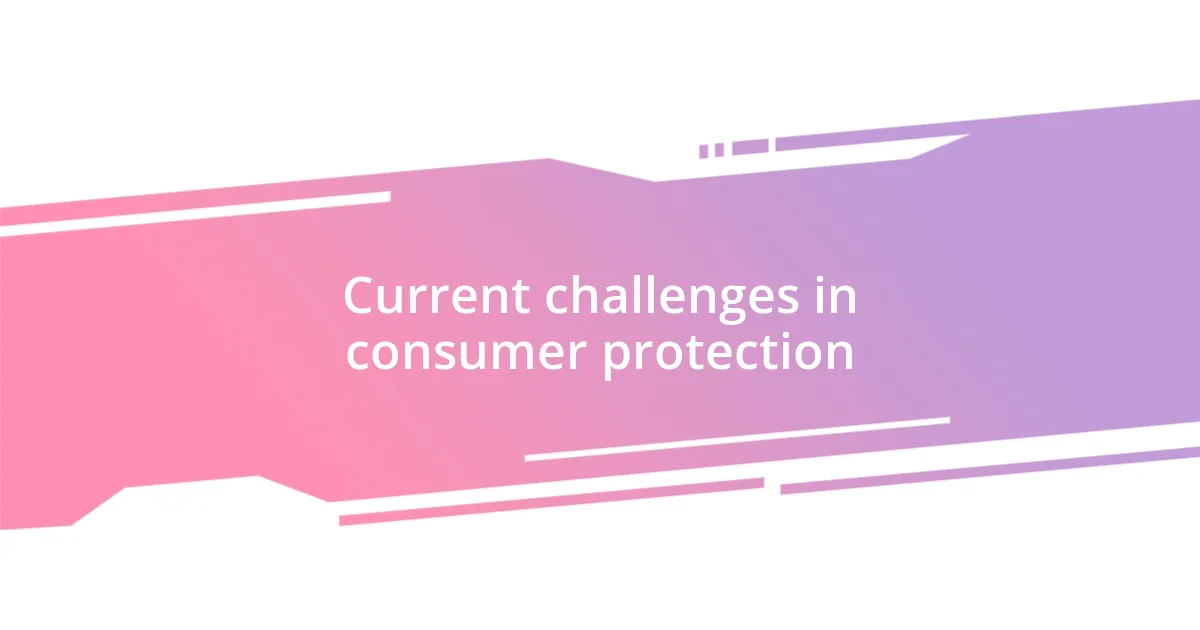
Current challenges in consumer protection
The landscape of consumer protection is evolving rapidly, yet numerous challenges persist. For instance, the rise of online shopping has led to a bewildering array of sellers, many of whom operate with little oversight. I remember a time when I ordered a product that never arrived, and navigating the return process was like finding my way through a maze. Isn’t it frustrating when the very platforms that should protect us become havens for unscrupulous sellers?
Another significant hurdle is the constant struggle to keep laws updated with the pace of technology. As digital transactions and services dominate, many current laws feel outdated. I recently tried filing a complaint about a subscription service that auto-renewed without my explicit consent. It made me realize how crucial it is for consumer protection laws to adapt to our changing realities. Why should we, as consumers, have to fight tooth and nail for clear terms and fair treatment when businesses should be held accountable?
Moreover, the challenge of awareness is often overlooked. Many consumers remain unaware of their rights or the tools available to them. I encountered this firsthand during a community workshop where participants were shocked to learn about protections they didn’t even know existed. Why should anyone navigate the marketplace without the knowledge of their rights? It’s vital that education becomes a part of consumer protection to empower individuals, ensuring we all feel confident standing up for ourselves.

Steps to advocate for consumer rights
Taking proactive steps to advocate for consumer rights can feel empowering, and I find it essential to start with education. Knowledge is our strongest ally. In my own experience, when I discovered my rights regarding faulty products, it ignited a passion within me to share that information with friends and family. Have you ever seen the light in someone’s eyes when they realize they have the power to demand better treatment? It’s exhilarating!
Joining consumer advocacy groups can amplify our voices even further. I remember attending a local meeting with a group focused on fair pricing policies. The discussions were invigorating, showcasing how collective action can lead to significant changes. It made me wonder: if we unite, could we challenge unfair practices more effectively than going solo? I believe the answer is a resounding yes.
Don’t underestimate the power of simply speaking up. When I had a frustrating experience with a misleading advertisement, sharing my story on social media not only brought attention to the issue but also prompted others to join in. It was a reminder of how our individual voices, when shared, can create a chorus that demands accountability. How often do we realize that one story can spark a movement? We all hold the potential to advocate for change in our everyday interactions.












